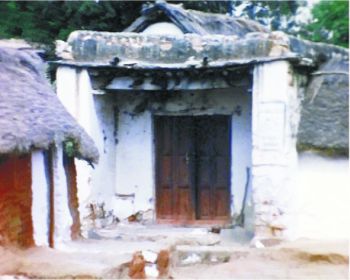![]()
![]()
![]()
![]()
![]()
![]()
The Power of Divine Love

The House where Baba was born
India is the probably the only country that has an unbroken link with ancient traditions and culture, rooted in the basic human values of Sathya, Dharma, Shanti, Prema and Ahimsa. This continuity has been sustained through millennia by saints and noble souls like the Buddha, Adi Shankara and Ramakrishna Paramahamsa, thanks to whom, being good was far more important for the masses, than being great. Not surprisingly, the founding fathers of our Republic gave us a National Motto based on Sathya, besides placing the Wheel of Dharma on the flag, to remind us of the supreme importance of righteousness in all aspects of human life.

Picture taken on 20th October 1940, when Baba dedicated himself to the
service of humanity.
The march of Time has, however, seen a steady erosion of moral values, with many wondering whether spirituality and morality are in fact outdated. When faith falters, judgement becomes clouded leading in turn to false priorities, making people forget that above all there is a Moral Law governing the Universe, as Gandhi succinctly put it.

The Tin shed that served as Baba's Ashram from 1940 to 1950.
While the attention of most might have drifted away from the basic inner strength of this country that has earned the admiration of philosophers and seekers from various lands, one person who, with great emphasis and much love, has consistently been calling attention to basic human values is Sri Sathya Sai Baba, whose 80th Birthday is being celebrated today all over India and indeed in many parts of the world.

Baba was born in a poor family in 1926 in a remote hamlet named Puttaparthi in Anantapur District of Andhra Pradesh. At birth he was named Sathya Narayana Raju. There was no school in his native hamlet, and for years, young Raju had to walk several kilometres to attend school in the neighbouring village Bukkapatnam. Later, he went with his elder brother, a schoolteacher, to Kamalapuram and Uravakonda [both in Andhra Pradesh], to study there.

Many years ago, out of compassion, Baba had a Mosque built in Puttaparthi
so that the Muslims of the village did not have to trek a long distance to
go to a Mosque in order to say their prayers.
Sathya Narayana Raju was brilliant in studies and his family naturally pinned high hopes on the young lad, expecting that he would enter Government Service and rise to a very high position, providing thereby the ultimate security. However, that was not to be for, at the age of fourteen, Sathya as he was called by his parents, sprang a huge surprise. In October 1940, he left school, snapped ties with his family and vowed to serve humanity. No one could understand how a poor village boy, that too a school dropout, would be able to serve humanity in a big way; nor did anyone believe that he would; but he did, and therein lies the story of the power of Divine Love.

In the Bhagavad Gita, Krishna emphatically declares that His Power is present everywhere in the Cosmos, from the ant to the galaxy, and that everything that man thinks he has achieved is actually the result of Divine power animating an otherwise inert body. Reminding humankind of this profound truth, Baba, or Swami as his devotees now address him, says that man is a composite of the gross body, subtle Mind and the Immortal Soul or the Atma. It is the Atma that is always the source of energy and values, whether humans acknowledge it or not. When the individual forgets his or her true nature as an embodiment of the Divine then values get excluded automatically in the life of such a person.
Once values get eroded in Society, it is inevitably plagued by wealth acquisition without honest work, education without character, commerce without morality, business without ethics, science without humanity, politics without principle, and so on. Indeed, this is the current situation in many parts of the world, leading in turn to many acute social problems. Many wonder: "Is this to be the ultimate fate of humanity, more and more strife, conflict and inequity?" Baba says it does not have to be; all that the individual has to do is remember that he or she is verily the embodiment of the Atma and thus of Prema or Divine Love. Once individuals make Prema the source of all their actions, the current trend HAS to reverse. To stress that Prema is latent in all without exception, Baba always addresses his audience as Premaswaroopalara or the Embodiments of Divine Love.
Prema or Divine Love is not what humans normally describe as love, which is invariably based on bodily relationship, between members of the family, etc. Prema, on the other hand, is the Love God has for His children, and is totally Selfless. Baba says that even problems that seem very difficult can be solved if one adopts the Path of Prema or Selfless Love. Indeed Baba's life has been a constant demonstration of this truth, which is why he often says that his life is his message.
Selfless Love is a remarkable catalyst, whose power comes from sheer Purity of thought, word and deed. Way back in 1940 when Baba started his mission of service, Puttaparthi was unheard of; there was not even a road leading to the hamlet. Yet, today that very place is not only known the world over but has also been described by late Howard Murphet of Australia as the place where the road of the spiritual seeker ends, as many have actually discovered.

There is only one caste,
The caste of Humanity.
There is only one Religion,
The Religion of Love.
There is only one Language,
The Language of the Heart,
There is only one God,
and He is Omnipresent.
- Sathya Sai Baba